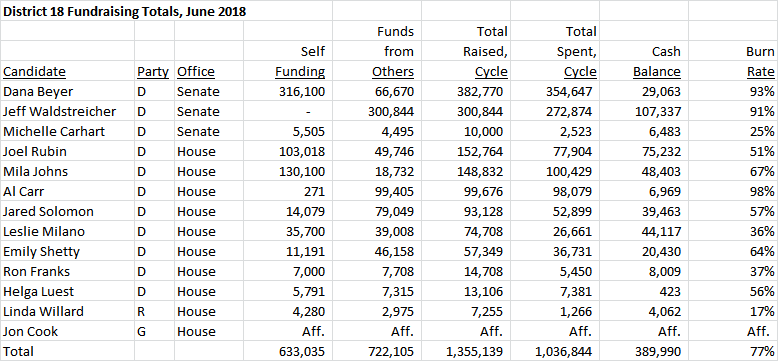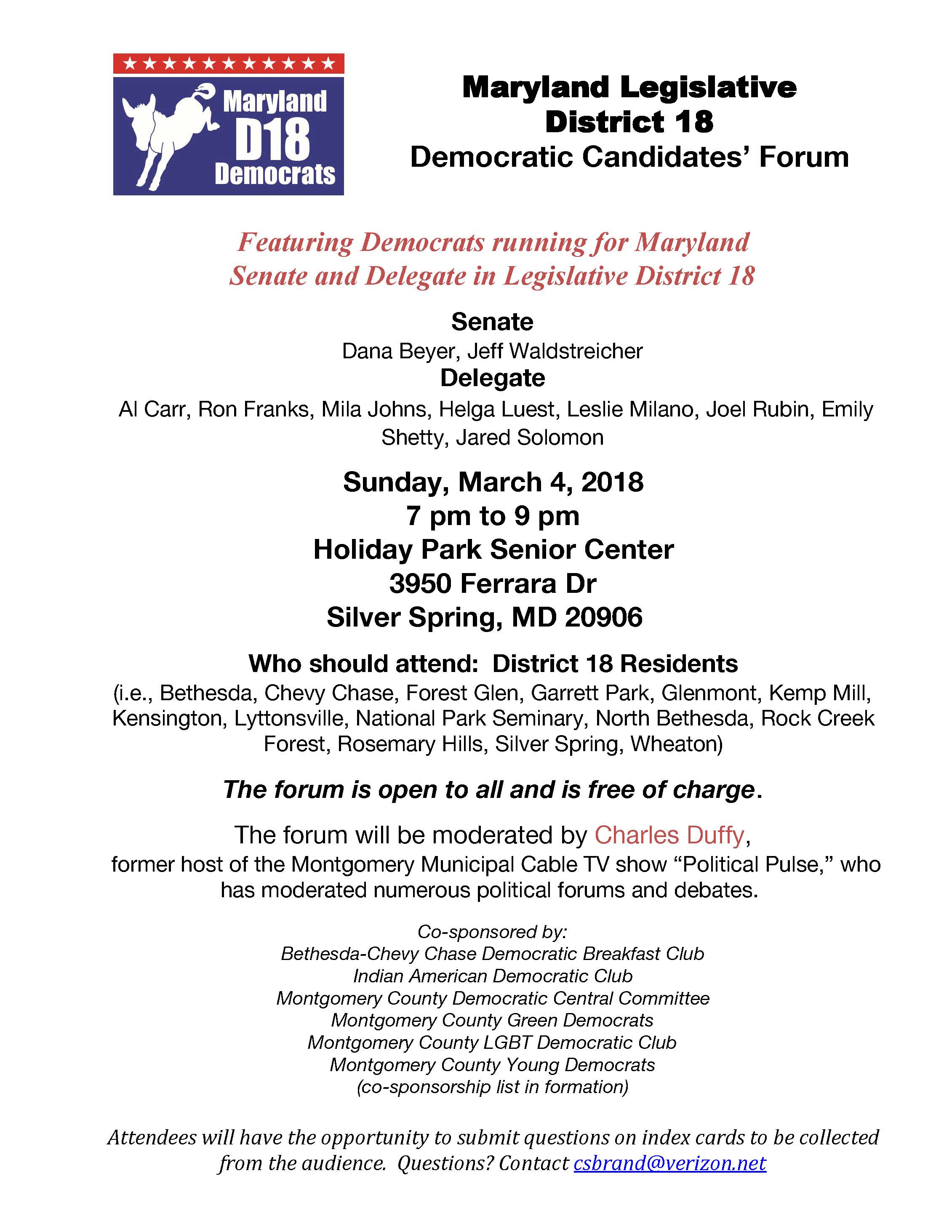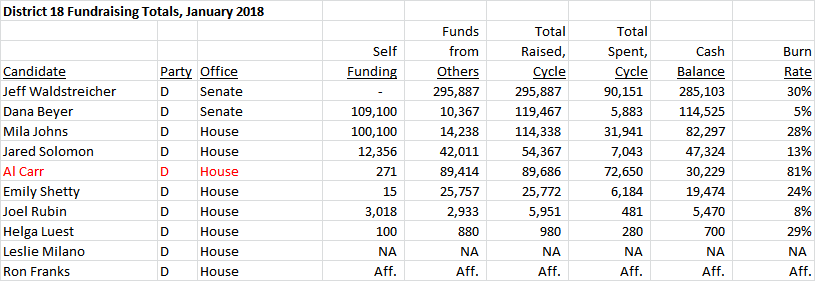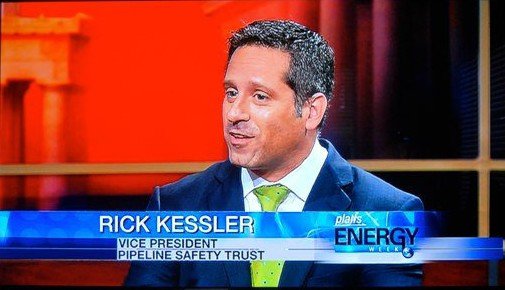By David Lublin and Adam Pagnucco.
Folks, this is an unusual joint post from the two of us. David and Adam both live in District 18 and we’ve seen a lot of action here over the last few cycles, so we decided to write this one together. Each of our remarks are labeled so you know who is saying what. We begin by printing the June financial summary and the endorsements below. We include the Senate candidates in that data but today’s post is on the House race.
Update: The original totals we reported for Emily Shetty were incorrrect. The correct ones are below.
David
District 18 is blessed with eight (count ‘em!) candidates for the three delegate seats. How is the race shaping up as we head into Election Day?
Helga Luest created one of the real moments of the campaign when she attacked Del. Jeff Waldstreicher, a candidate for Senate, as sexist for trying to recruit her into the Senate race. Her “low carb” campaign is catchy but makes me think about the Atkins Diet rather than carbon emissions and the environment.
Regardless, Helga is not likely to come in the money because she just hasn’t raised enough of it to engage in sufficient voter contact. Ron Franks has run an earnest campaign and made a positive impression on voters who have met or seen him but faces the same fundamental problem. Like Helga, Ron has raised less than $15K, which is just not enough to win.
That leaves six other candidates, including incumbent Del. Al Carr. (Disclosure: I am supporting Al.) Maryland Matters sees Al as highly vulnerable, pointing to his past victories as part of a slate and that he has raised less money than several other aggressive, hungry candidates.
I see it differently. Though he has less money, he has raised just a hair under $100K, plenty of money for a delegate race and well over the threshold needed for sufficient voter contact. A former municipal official, Al has cultivated a network of support among local municipal, civic and environmental activists.
This is Al’s fourth time on the ballot with two previous victories under his belt, so he has greater name recognition. I also note that Al has managed to do just fine even when opposed by the Washington Post and the Post isn’t making endorsements this year. Finally, he has far more endorsements than the other candidates. In a crowded race, he has consistent support.
Adam
I agree with David that Helga Luest and Ron Franks don’t have the resources to compete. I think Al Carr will probably win but I am less confident of that than David. In 2010 and 2014, Al ran as part of a united slate of incumbents headed by Senator Rich Madaleno. (I was the slate Treasurer from 2008 through 2012.) In the one race that he ran by himself – 2006 – he finished seventh of eight. Times are different now because Al is the only incumbent running for one of three seats. That’s a huge advantage. But the Delegate field is very strong this year with several well-financed and hungry new candidates. I think Al will win but if he doesn’t I won’t be shocked.
David
Emily Shetty came in a strong fourth in 2014 and worked very hard to maintain visibility since the last election. She was a leader in the D18 Democratic Caucus and now on MCDCC as a gender-balance appointee. She has raised more than last time, though less than anyone besides Luest or Franks, and doesn’t face a slate of incumbents. Emily has tried to position herself as left wing and a new mom, succeeding better at the latter.
Word on the street is that Emily has been working very hard at the doors and run a good, focused campaign. Though she missed out on the Apple Ballot, Emily has secured a number of nice endorsements, partly because organizations perceive her as a likely winner. The one major downside: she was endorsed by the Washington Post last time and used the endorsement well to close strong. She won’t have that advantage this time.
By all rights, Leslie Milano ought to be out of the mix. She entered the race late, has fewer endorsements and has raised less money than all but Shetty, Franks and Luest. Nevertheless, Leslie has managed to make herself a strong contender. Though still relatively young, she is a bit older than several candidates and has made a consistent impression as someone with a real edge in terms of experience and maturity. Combined with authenticity, she strikes many voters as trustworthy and with the potential to be a strong delegate. At least in my area, she has sent out unusually strong neighbor letters with grassroots support. Still, she is making up ground.
Adam
I like Emily and Leslie very much. Emily should be a model for politicians who lose their first race. The temptation is to say, “Never again!” and go back to a sane life. That’s totally understandable! But Emily decided to stay involved, joining the Central Committee and working with both Action Committee for Transit and the Wheaton Hills Civic Association. She has many more relationships now than when she first ran and is a stronger candidate. I think she will win.
Leslie is one of my favorite new candidates in the entire county. She is a very smart, charismatic and experienced person who is also a hard worker and a good listener. Most of my friends in the D18 activist community love her to death. She’s also versatile. If you’re a progressive, you will love her work to pressure sweatshops to clean up their acts earlier in her career. If you’re more of a moderate, you will love her emphasis on jobs and the economy. But as David noted, she got in late and that hurt her ability to garner institutional endorsements. If Leslie doesn’t win this time, I would like to see her come back and try again.
David
Jared Solomon is a young teacher and I hear repeated whispers from many that he’s extremely nice and seems on track to win one of the delegate seats. While his fundraising is lower than some at $93K, it is certainly well above the threshold for a strong campaign and Jared has run a very hard, engaging campaign. Among the non-incumbents, only Emily can go toe-to-toe in endorsements and he is on the Apple Ballot.
If this election were about signs and money, Joel Rubin would win a walk. In the Town of Chevy Chase, where he won election to the Town Council in 2017, I see about twenty of his signs as I walk into Bethesda. At $152K, he has also raised more money than anyone else in the field. As my mailbox indicates, he is closing with a lot of mail. A former political appointee in the State Department, Joel has real communication skills and a lot of foreign policy experience.
Joel sought the Democratic nomination for Congress in 2016. In terms of votes, it didn’t go well but he acquitted himself well and it turns out his donors were still ready to help fund his state legislative campaign just two years later. This previous campaign expanded his name recognition but his emphasis on national politics, including in some campaign videos, and running for offices at different levels of government, may not play well with all voters. On the other hand, his videos about his family are among the best and a great, authentic American story. He’s on the Apple Ballot but has few other endorsements from groups.
Mila Johns has made a real presence on social media. She speaks her mind both on Facebook and in forums, coming across as an opinionated, honest, straight shooter – welcome characteristics in an age where people are tired of canned politicians. At the same time, though social media is important, nothing beats meeting voters and our Facebook circles are often tighter loops than we realize.
Mila is also just a bit behind Joel in terms of having raised money and started sending mail out earlier than other candidates (i.e. before we started getting ten pieces a day). Like Leslie, she could use a few more endorsements but has accomplished the difficult feat of standing out in a crowded field in a very busy election year.
Adam
Jared is one of the strongest candidates in the race. He has done everything right – he’s on more doors than an encyclopedia salesman, he makes a great impression, he has raised decent money and he has a bunch of endorsements. He is also the only candidate who has ever mailed me a personal, handwritten thank you letter after a round of drinks. I love old school manners like that! Mila and Joel are good candidates who have enough money and support to be in the mix too.
Overall, this field is outstanding and is a result of the electoral spigot finally opening after three straight terms of the same four incumbents. I wouldn’t trade our House candidates with any other district in the state. I expect Emily, Jared and Al to win with Leslie having a chance to break through and Mila and Joel also getting big shares of votes.
David
This is a great field of candidates and District 18 is guaranteed to have turnover in at least one-half of its state legislative delegation. The newbies may be in office a long time, so make your choices thoughtfully.








